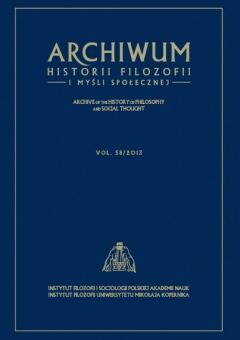Homo homini deus est – homo homini lupus est. Some Remarks concerning Hobbes’ View of Human Nature
Jakub Szczepański
The subject of the article is the question concerning Thomas Hobbes’ view of human nature. This question goes hand in hand with his famous sentence: homo hominilupus est. In the first part of article, the provenance of this citation is described. Subsequentsections are devoted to an attempt to establish how accurately Hobbes saw the basic features of the human condition. The next issue under consideration is the proper sense of another famous Hobbesian citation: bellum omnium contra omnes.
The conclusion of the article runs as follows: the true Hobbesian opinion about human nature is different than that which is ascribed to him. A reconstruction based on the texts seems to be more complex and leads to the conclusion that the main motive behind human actions is fear.
 | Szczepanski-58 |
Keywords: Hobbes · state of nature · war · fear
Jakub Szczepański – Ph.D., Assistant Professor at the History of Philosophy Departmentin the Jagiellonian University’s Institute of Philosophy. Interests: The philosophy ofthe 17th and 18th centuries, the philosophy of politics. His specialization is Kantian political philosophy. He is the author of the book: Political Judgment and he has published in, amongst others: „Philosophical Quarterly”, „Political Review” and a number of anthologies.
The journal founded by Leszek Kołakowski, Bronisław Baczko and Jan Garewicz appears continuously since 1957.







